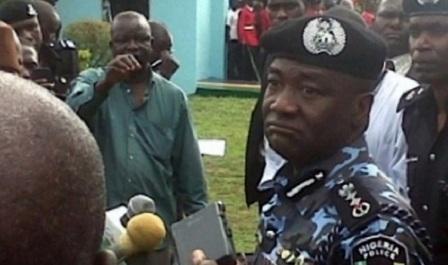MAIDUGURI, NIGERIA — The landscape that stretches away from the serpentine border separating northeastern Nigeria from Cameroon is arid, barren and very difficult to defend.
Which is why Malo, a corporal in a Nigerian mobile police unit, and his fellow officers were glad to see a convoy of reinforcements unexpectedly show up where their patrol was resting earlier this month, near the border village of Gamboru.
Then the reinforcements, which included army-issue armored cars and heavy-caliber weaponry, began shouting ”Allahu Akbar!” and opened fire; 13 police officers were killed in the ambush, Malo told VOA in an exclusive interview.
Their bodies rotted in the hot sun for three days. The bogus reinforcements, he said, were Boko Haram militants.
”These insurgents come armed with thousands of bullets, and we carry only 30,” said Malo, a 14-year veteran officer who asked to be identified only by his first name to avoid retribution from his superiors.
”You cannot get 60 bullets until you pay a bribe. How in the world can you fight someone who attacks you with thousands of bullets while you have only 30?” he asked.
Boko Haram notoriety
After years of notoriety, Boko Haram exploded into the global consciousness in April, with the abduction of more than 200 schoolgirls.
The kidnapping has struck a chord worldwide, with the Twitter hashtag #BringBackOurGirls going viral and celebrity mentions on film festival red carpets.
Boko Haram’s dangers merited mention in U.S. President Barack Obama’s speech at the U.S. Military Academy on Wednesday, and U.S. military personnel are helping in the search.
Outrage is also building about the seeming inability of the Nigerian government to either locate the schoolgirls or mount a coherent response to Boko Haram’s audacious attacks.
Underscoring that fact, suspected Boko Haram gunmen on Friday killed a traditional Muslim emir and two policemen in northeastern Nigeria.
Sources told VOA’s Hausa Service that about 100 gunmen ambushed the convoy of three traditional leaders as it traveled in Gombe state.
A local journalist said the Emir of Gwoza, Idris Timta, died of an apparent heart attack when the gunmen attacked. Other sources said the Emir of Uba, Alhaji Ali Ismail Mamza, was missing after the ambush and is believed to have been abducted.
The third traditional leader, the Emir of Askira, escaped when his car turned around and sped away at the first signs of attack.
In a briefing with VOA editors this week, a top Nigerian official said the government is battling unprecedented terrorism and is doing its best to track down Boko Haram militants.
Nigerians, though, are increasingly pointing to rampant corruption and incompetence among police and military units, a point the police officer, Malo, was quick to affirm.
Audacious attack
The May 5 attack in Gamboru was audacious in both its scope and planning.
In the convoy used by the attackers, Malo told VOA, were two armored vehicles mounted with high-caliber guns that had Nigerian army emblems on them – an indication they had been stolen or seized from a federal arsenal somewhere. The other vehicles were Toyota pickup trucks.
Some of the attackers also wore army-issue camouflage.
Malo said his unit — which is analogous to a rapid response tactical police team — has often gone hungry since being deployed five months ago to the northeastern state of Borno, whose capital is Maiduguri.
He said his police colleagues’ bodies rotted in the sun for three days because the state government refused to pay the required embalming fees to the local hospital.
Among rank-and-file officers, many feel that senior officers are purposely avoiding confronting Boko Haram militants head-on so they can skim off the increasing funding, and supplies, for their own purposes.
Malo said he gets paid the equivalent of about $200 a month, a minuscule sum given rising prices and the fact that he’s working to battle a violent insurgency.
”It is a big joke to invite the world to come and fight for us. We have the necessary gear to fight this battle, but we are not being given the tools,” he said. ”How do you want us to fight them? With our bare hands?
”For goodness sake, how can a hungry policeman arrest anyone, I ask you?” he added.
Ongoing frustrations
The frustrations were underscored earlier this month when army soldiers fired on the car of a general, whom they blamed for allowing the deaths of fellow soldiers at the hands of Boko Haram militants.
Since the schoolgirl abductions, Boko Haram, which believes that Western education and other influences are corrupting Islam, has stepped up its campaign of bombings and violence.
More than 200 people have been killed in attacks over the past week.
President Goodluck Jonathan has faced withering criticism for his government’s response to the kidnapping.
Last Sunday he ruled out negotiations to free the girls, saying the captives should be released “unconditionally.” But cabinet officials said Friday that talks have not been ruled out.
In a recorded speech released Thursday, Jonathan pledged to wage a “total war against terrorism” and said he had instructed his security forces to use any lawful means necessary to end the “impunity” of terrorists on Nigerian soil.
The country’s defense chief, Air Marshal Alex Badeh, has said the military knows the girls’ location, but does not want to risk their lives with a rescue operation.
Continue reading @VOA



Leave a Reply